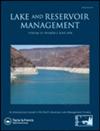湖泊底栖大型无脊椎动物定量取样底栖雪橇的设计与使用
IF 0.8
4区 环境科学与生态学
Q4 LIMNOLOGY
引用次数: 0
摘要
摘要Detmer TM,McCutchan JH Jr.设计和使用海底雪橇对湖泊中的表海底大型无脊椎动物进行定量采样。湖泊保护区管理。37:289–299。底栖大型无脊椎动物,包括表海底分类群,影响湖泊生态系统的结构和功能。本文介绍了一种用于海底大型无脊椎动物定量采样的海底滑车的设计和应用。雪橇的评估和测试包括测量过滤效率和捕获效率,以及将雪橇样品与D型框架网和取芯采样器的样品进行比较。海底雪橇的过滤效率为33 ± 2.8%(平均值 ± SE),并且在长达15的距离上不受牵引距离的影响 m。在对过滤效率进行校正之后,通过水下摄像确定的捕获效率为83 ± 9.4%(平均值 ± SE)。我们发现Corixidae的采样装置之间没有差异,但与D型框架网相比,海底雪橇对Sihlonoride的采样要有效得多。因此,使用D-net的标准扫描可能存在分类偏差。对于来自科罗拉多州13个山区湖泊的一组样本,用海底雪橇采集的样本和用取芯采样器采集的样本之间的群落组成差异很大。本文所述的海底雪橇是研究湖泊中表海底大型无脊椎动物的有用工具,尤其是在无鱼湖泊和其他表海底类群占主导地位的湖泊中。最终,在湖泊底栖生物研究中应用底栖生物橇,结合活塞取芯器等其他采样设备,可能有助于更全面地了解湖泊生态系统中的底栖生物群落、种群动态和能量流。本文章由计算机程序翻译,如有差异,请以英文原文为准。
Design and use of a benthic sled for quantitative sampling of epibenthic macroinvertebrates in lakes
Abstract Detmer TM, McCutchan JH Jr. Design and use of a benthic sled for quantitative sampling of epibenthic macroinvertebrates in lakes. Lake Reserv Manage. 37:289–299. Benthic macroinvertebrates, including epibenthic taxa, affect the structure and function of lake ecosystems. This article describes the design and application of a benthic sled for quantitative sampling of epibenthic macroinvertebrates. Evaluation and testing of the sled included measurements of filtration efficiency and capture efficiency, as well as comparisons of sled samples with samples from a D-frame net and a coring sampler. Filtration efficiency for the benthic sled was 33 ± 2.8% (mean ± SE) and was not influenced by tow distance over distances up to 15 m. After correction for filtration efficiency, capture efficiency as determined by underwater videography was 83 ± 9.4% (mean ± SE). We found no differences between devices for sampling Corixidae, but Siphlonuridae were sampled much more effectively by the benthic sled than with the D-frame net. Thus, there may be taxonomic biases with standard sweeps using a D-net. For a set of samples from 13 mountain lakes in Colorado, community composition differed greatly between samples collected with the benthic sled and those collected with a coring sampler. The benthic sled described here is a useful tool for the study of epibenthic macroinvertebrates in lakes generally, and particularly in fishless lakes and other lakes where epibenthic taxa can be dominant. Ultimately, application of benthic sleds in studies of lake benthos, in combination with other sampling devices such as piston corers, may contribute to a more complete understanding of benthic communities, population dynamics, and energy flow in lake ecosystems.
求助全文
通过发布文献求助,成功后即可免费获取论文全文。
去求助
来源期刊

Lake and Reservoir Management
环境科学-海洋与淡水生物学
自引率
6.70%
发文量
22
期刊介绍:
Lake and Reservoir Management (LRM) publishes original, previously unpublished studies relevant to lake and reservoir management. Papers address the management of lakes and reservoirs, their watersheds and tributaries, along with the limnology and ecology needed for sound management of these systems. Case studies that advance the science of lake management or confirm important management concepts are appropriate as long as there is clearly described management significance. Papers on economic, social, regulatory and policy aspects of lake management are also welcome with appropriate supporting data and management implications. Literature syntheses and papers developing a conceptual foundation of lake and watershed ecology will be considered for publication, but there needs to be clear emphasis on management implications. Modeling papers will be considered where the model is properly verified but it is also highly preferable that management based on the model has been taken and results have been documented. Application of known models to yet another system without a clear advance in resultant management are unlikely to be accepted. Shorter notes that convey important early results of long-term studies or provide data relating to causative agents or management approaches that warrant further study are acceptable even if the story is not yet complete. All submissions are subject to peer review to assure relevance and reliability for management application.
 求助内容:
求助内容: 应助结果提醒方式:
应助结果提醒方式:


